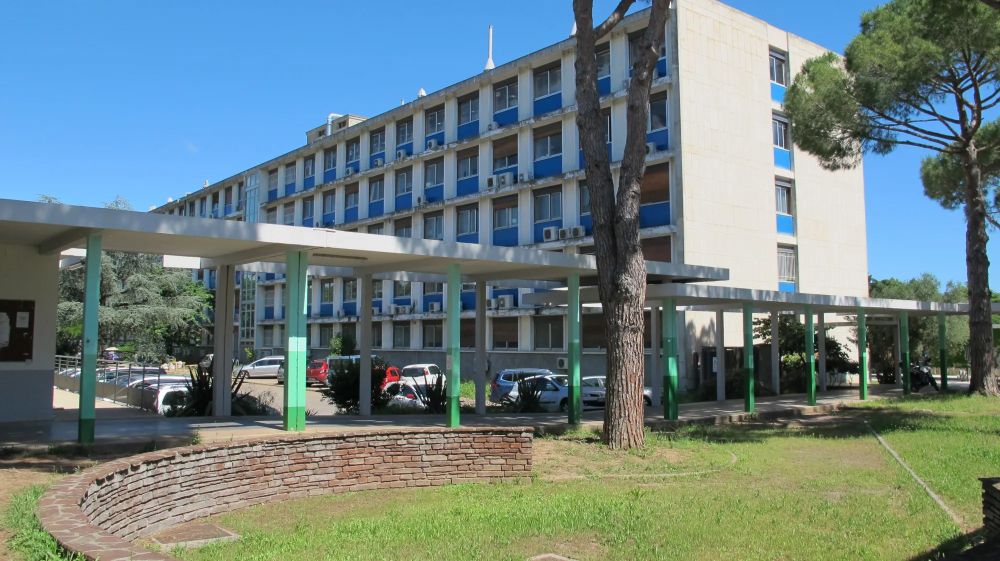
Highly destructive mussel has started to invade the Amazon
After ravaging waterways across South America, the fast-spreading species threatens a biodiversity stronghold
The golden mussel, a highly destructive invasive species that began to plague South American waterways decades ago, has reached the Amazon region, threatening some of the richest biodiversity on the planet. https://scim.ag/4rq3gFz
20.02.2026 17:49 —
👍 29
🔁 13
💬 0
📌 1

Have you ever asked yourself, how insect brains represent places? And whether insects do have place cells? Then move to Germany this summer and start your PhD in my lab. We conduct tetrode recordings from bumblebees that freely forage laboratory mazes. 🧠🐝#BeeSpace @erc.europa.eu @neuroethology.org
20.02.2026 12:06 —
👍 38
🔁 32
💬 0
📌 1

Welcome
ExE 2026 is a 3-day conference aimed at evolutionary ecologists from around the world, hosted by the University of Exeter in beautiful Cornwall. It provides a friendly and inclusive platform for all c...
For folks in #Ecology and #Evolution, we are hosting a conference here in Cornwall UK! Great chance for a summer staycation June 29-July 3.
Plus, we've managed to make it affordable: £250 + £49/night for accommodation.
#EvolBiol #EcoEvo
sites.exeter.ac.uk/exe/
20.02.2026 07:12 —
👍 13
🔁 12
💬 1
📌 0

Four decades of road salt take their toll on Toronto’s waterways
After a record-breaking snowstorm, melting ice is flushing tonnes of road salt into Toronto’s waterways. New data shows how much the city uses and why experts say the real problem may lie in the priva...
Toronto is covered with road salt right now, which will eventually end up in the city's waterways, where it disrupts ecosystems. To get an idea of how much we're talking, I got salt figures from the city going back to the 80s: nearly 5 million tonnes. For @nationalobserver.com
18.02.2026 20:22 —
👍 7
🔁 5
💬 1
📌 1

Come to Hamburg and do a PhD on insect/spider traits with me!
03.02.2026 09:08 —
👍 24
🔁 23
💬 0
📌 0
😱⏰Only 2 days left! Submit your abstract and get the early bird rate for the XIII European Congress of Entomology (29 June – 3 July 2026, Tours, France)! 🪲🦋🐜🪰
All details and submission: ➡️https://www.ece2026.org/
@irbi-tours.bsky.social
@ece2026tours.bsky.social
@royentsoc.bsky.social
29.01.2026 13:43 —
👍 4
🔁 4
💬 1
📌 1

Uppsala in late autumn
Join us at the Evolutionary Biology Centre at Uppsala University. We’re searching for an Assistant Professor in Biology. www.uu.se/en/about-uu/...
28.01.2026 20:28 —
👍 158
🔁 186
💬 1
📌 5

Réchauffement climatique : l'industrie du ski en flagrant déni
En montagne, chaque degré de réchauffement climatique équivaut à un mois d'enneigement perdu. Pourtant, les responsables des stations de skis s'obstinent, sous perfusion de subventions publiques. ⛷️
👉 www.socialter.fr/article/rech...
#ski #montagne #climat
27.01.2026 15:50 —
👍 8
🔁 7
💬 0
📌 0

⛰️ Take a look at a study that compared plant-pollinator communities in the Gavarnie-Gèdre commune of the Pyrenees across 115 years to assess the impact of climate change.
Access the publication here: doi.org/10.1098/rspb...
#ANTENNAexpertise
26.01.2026 12:04 —
👍 2
🔁 1
💬 1
📌 0

GBE | The evolution of bees: insights from ‘omic studies
Brenman-Suttner & @amrozayed.bsky.social review how 'omics tools provide insights into the molecular basis of bee eusociality and adaptation, and allow us to address urgent challenges facing bee conservation due to anthropogenic change
🔗 doi.org/10.1093/gbe/evaf226
📸 Amro Zayed
#genome #evolution
07.01.2026 12:46 —
👍 5
🔁 2
💬 1
📌 0
Open Positions – GEvol – DFG SPP 2349
📢 GEvol Job Alert: PhD position in Joachim Kurtzs lab in Münster in the Institute for Evolution and Biodiversity. This research project focuses on the evolutionary flexibility of epigenetic regulation in insects. Find this and more open positions @ g-evol.uni-muenster.de/open-positio... 🧬
02.12.2025 12:24 —
👍 0
🔁 2
💬 0
📌 0

Senior Editor for Journal of Applied Ecology - British Ecological Society
Join the editorial board on Journal of Applied Ecology! Apply by 21 Dec 2025.
We're looking for a 6th Senior Editor!
If you…
👉are intrigued by the interface between ecology & biological resource management
👉are interested in contributing to the journal’s strategic vision
👉have editing experience
…we’d love to hear from you!
www.britishecologicalsociety.org/content/seni...
19.11.2025 13:25 —
👍 8
🔁 11
💬 0
📌 0
Posnien - Georg-August-Universität Göttingen
Webseiten der Georg-August-Universität Göttingen
🧬 PhD Position: Evolutionary & Comparative Genomics 🕷️
Join us at @uni-goettingen.de for a 3-year PhD (65% TV-L E13).
We will investigate the genomic & phenotypic impact of gene duplication across 233 arthropod genomes!
More infos 👇 and s.gwdg.de/eDrAAY
#Evolution #Genomics #Bioinformatics
18.11.2025 07:04 —
👍 25
🔁 29
💬 3
📌 0
Good morning everyone 🌞
There is only 1 seat left for the #Phylogenomics course in December!
If interested, check it out before it is too late!
10.11.2025 09:35 —
👍 3
🔁 2
💬 1
📌 0

📢 Open Call! The Max Perutz Labs invite applications for a Tenure-Track Professorship in Genome Biology. We are particularly interested in researchers investigating the molecular and biophysical mechanisms underlying genome function and regulation. More details ➡️ tinyurl.com/3t7vvdct
05.11.2025 10:58 —
👍 32
🔁 35
💬 0
📌 1
![(A) An adult female in the field on Sicyos angulatus. (B) Back view of an adult female reared on cucumber, whose hindleg organs are covered with fungal hyphae (arrowheads). (C) Magnified image of the hindleg organ. (D to L) Morphology of hind tibia of adult male [(D) to (F)], immature adult female [(G) to (I)], and mature adult female [(J) to (L)]. [(D), (G), and (I)] Brightfield images. [(E), (H), and (K)] Scanning electron microscope (SEM) images. [(F), (I), and (L)] Magnified SEM images. (M to O) Peculiar behavior of egg-laying adult female. After laying each egg (M), the female rhythmically scratches the hyphae-covered hindleg organ with tarsal claws of the opposite hindleg (N) and then rubs the egg surface with the claws in a skillful manner (O). Also see movie S1. (P to R) Egg mass covered with fungal hyphae at 0-day (P), 3-day (Q), and 10-day (R) intervals after oviposition. Reddish color of 10-day eggs reflects the body color of developing nymphs inside.](https://cdn.bsky.app/img/feed_thumbnail/plain/did:plc:vqgovau5gkirnk3ss5qwjdmz/bafkreiatozcclrv3q5pr2susooiojtvkwr6kwnd22hwxh3ijzh7lpi276q@jpeg)
(A) An adult female in the field on Sicyos angulatus. (B) Back view of an adult female reared on cucumber, whose hindleg organs are covered with fungal hyphae (arrowheads). (C) Magnified image of the hindleg organ. (D to L) Morphology of hind tibia of adult male [(D) to (F)], immature adult female [(G) to (I)], and mature adult female [(J) to (L)]. [(D), (G), and (I)] Brightfield images. [(E), (H), and (K)] Scanning electron microscope (SEM) images. [(F), (I), and (L)] Magnified SEM images. (M to O) Peculiar behavior of egg-laying adult female. After laying each egg (M), the female rhythmically scratches the hyphae-covered hindleg organ with tarsal claws of the opposite hindleg (N) and then rubs the egg surface with the claws in a skillful manner (O). Also see movie S1. (P to R) Egg mass covered with fungal hyphae at 0-day (P), 3-day (Q), and 10-day (R) intervals after oviposition. Reddish color of 10-day eggs reflects the body color of developing nymphs inside.
What looked like a hearing organ on a tiny stinkbug’s leg turned out to be something far stranger: a fungal nursery that mother bugs use to coat their newly laid eggs in protective symbiotic hyphae, shielding their offspring from parasitic wasps.
Learn more in Science: https://scim.ag/4nDrDNm
01.11.2025 21:14 —
👍 134
🔁 33
💬 0
📌 6
Join us in Montpellier if you are interested in #evolution #genomics #adaptation #invasive species or if you want to get to know a collegial group of #Drosophila enthusiasts
31.10.2025 17:59 —
👍 9
🔁 6
💬 0
📌 0
Validate User
New publication alert!
Fertilization impacts microbiomes along the grassland trophic chain academic.oup.com/ismecommun/a...
#organicfertilizers #landusechange #microbiome #grasslands #onehealth
18.09.2025 07:55 —
👍 4
🔁 3
💬 0
📌 0

Cartoon illustration depicting a sick Drosophila melanogaster surrounded by different viruses, symbolizing the impact of persistent viral infections on the model organism. Image credit Rubén González.
Persistent viral #infections in #insects are not as harmless as once believed. @salehlabparis.bsky.social &co show how such infections in #FruitFlies alter survival, reproduction, behavior & gene expression, revealing the hidden costs of #viral persistence @plosbiology.org 🧪 plos.io/4olpuXm
13.10.2025 13:08 —
👍 41
🔁 14
💬 1
📌 2

ecoevojobs.net 2025-26
UPDATE: The 2025-2026 list of faculty and postdoc positions in ecology and evolutionary biology is out! Be sure to check out this active and helpful community run resources! docs.google.com/spreadsheets...
19.09.2025 21:47 —
👍 245
🔁 229
💬 2
📌 6





















![(A) An adult female in the field on Sicyos angulatus. (B) Back view of an adult female reared on cucumber, whose hindleg organs are covered with fungal hyphae (arrowheads). (C) Magnified image of the hindleg organ. (D to L) Morphology of hind tibia of adult male [(D) to (F)], immature adult female [(G) to (I)], and mature adult female [(J) to (L)]. [(D), (G), and (I)] Brightfield images. [(E), (H), and (K)] Scanning electron microscope (SEM) images. [(F), (I), and (L)] Magnified SEM images. (M to O) Peculiar behavior of egg-laying adult female. After laying each egg (M), the female rhythmically scratches the hyphae-covered hindleg organ with tarsal claws of the opposite hindleg (N) and then rubs the egg surface with the claws in a skillful manner (O). Also see movie S1. (P to R) Egg mass covered with fungal hyphae at 0-day (P), 3-day (Q), and 10-day (R) intervals after oviposition. Reddish color of 10-day eggs reflects the body color of developing nymphs inside.](https://cdn.bsky.app/img/feed_thumbnail/plain/did:plc:vqgovau5gkirnk3ss5qwjdmz/bafkreiatozcclrv3q5pr2susooiojtvkwr6kwnd22hwxh3ijzh7lpi276q@jpeg)





